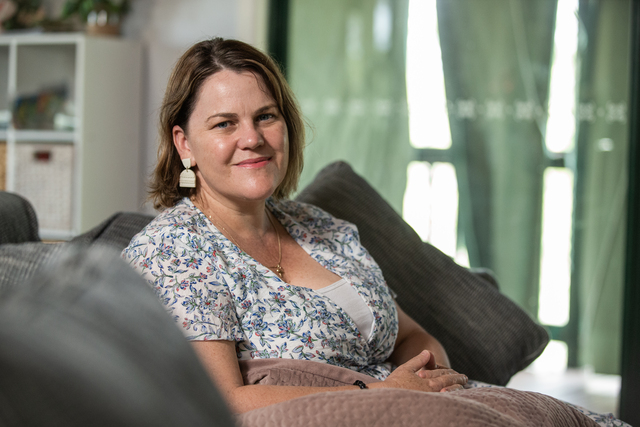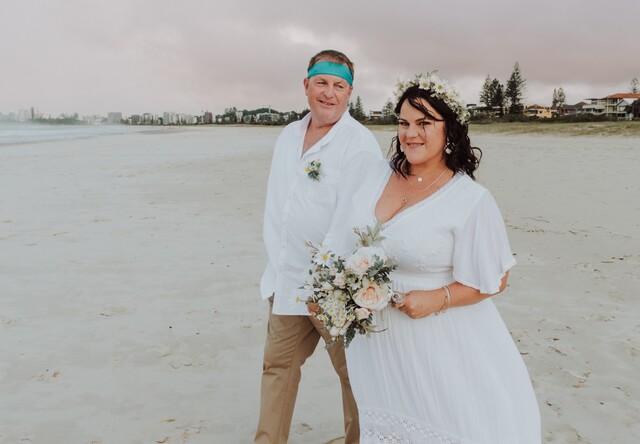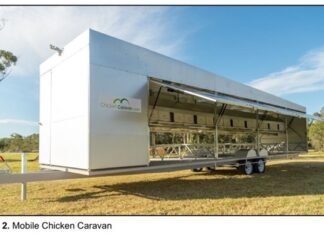As one of the Domestic and Family Violence Prevention Council Love ≠ Control campaign ambassadors, Heather McKoy is hoping that by sharing her story, she can help others to find the courage to identify their situation and take action to change their story.
For Heather, marriage meant security, unconditional love and having that special someone in your life who would go to the moon and back for you.
Someone, that no matter what challenges life throws up at you, will hold your hand and together, ride the waves to come out the other side even stronger.
For that reason, being a wife for Heather meant supporting her husband unconditionally, being loyal and loving that person through the good and the bad.
Looking back on her first marriage, Heather said she can now see that it also meant that she would be extremely forgiving and make excuses for his behaviour.
“It was my role to fix things,” she said.
“I can see now, and being aware of what coercive control is, that it started very early in our relationship, almost like six weeks in, but unfortunately, I didn’t know the signs.
“I just thought during the marriage that I was in a dysfunctional relationship and walking on eggshells was just the way it was.
“Being afraid of his violent mood shifts was due to me, that I was being oversensitive and emotional.
“I don’t think the blinkers really came off until my sister started mentioning it to my dad, who mentioned it to me and then a girlfriend said the words – ‘you should really look up coercive control because I think that is what is going on here’ and this was around eight years into our marriage.”
It was at this point that Heather read about coercive control and saw the power and control wheel that she could tick off the majority of the items listed, that she realised she lived in a dictatorship.
“At that point I was scared, I had lost all of my confidence, I was waiting for the next ‘blow up’ and afraid for what that was going to mean in terms of punishment.
“At my lowest point, I’d even contemplated ending my own life.”
Sadly, it actually took Heather took several turns to leave, firstly in 2017 for six months until she and her first husband started seeing a counsellor and working through their marriage issues.
“He started taking his aggression out on my son physically and I was afraid for him.
“Sadly, I went back to him after empty promises were made and then things got better for a while until it all came back but worse.
“I gave up my business at that point and he controlled everything.
“The second time was the last, late 2019 and it was after I realised, I was in a DVF situation called coercive control.
“I decided to record the conversation on my phone so I couldn’t be confused later, which often happened and I still have the recording.
“I’d read about coercive control and knew for sure and certain that I was in a DV relationship.
“I didn’t have bruises to show for it, but I was being entirely controlled and ruled by fear.
“I packed my bags, had a small amount of money in a savings account he didn’t know about and left with my children.”
The road to a new life was exceptionally hard for Heather as in 2019 she didn’t know about DV Connect, instead the counsellor she was talking to about coercive control charged her $100 a call and therefore she didn’t have enough money to continue the sessions.
“I went to Centrelink for help but they means test you, and given my husband’s business was earning a lot of money, I had no chance of getting financial help.
“I left in tears and even after explaining my situation to the lady at Centrelink, I was put on a computer to ‘self-serve’ and left with nothing.
“I didn’t go to the police as there were no laws for coercive control back then.
“I don’t think I would have wanted the police involved anyway as I would have had to have evidence or get witnesses involved and he was very good at confusing me and manipulation.
“I remember at some of our fights that I wished he’d hit me and then I could do something about it, but he wasn’t that stupid, it was never direct violence, more indirect.”
Asked if she could share one message with someone who is currently living with this kind of coercive control what would it be:
“I think people like me are prime targets for these people who have a need to have power and control.
“I’m a classic empath.
“I’m highly attuned to the energies and emotions of those around me, so much, that I absorb or take on other people’s problems as my own.
“My now ex-husband had an absolutely tragic upbringing.
“I’m talking DFV, child abuse and witnessing his own mother die in front of him in a car accident at the age of 10.
“I believe, to this day, his issues are directly related to all that baggage.
“I made excuses for his behaviour and blamed myself for my part in the never-ending conflict that was in the house. That I played a role and was therefore equally at fault.
“My message to another person living in this emotional roller coaster – please, call DV Connect and speak to someone or use the Be There app.
“Educate yourself.
“You may not want to leave the relationship but you could certainly do with support.
“To know that you’re not crazy and to blame for the situation is such a relief.
“They will use threats of ruining you financially or taking the kids away, but you don’t need to live a miserable life.
“Help is out there and you don’t need to have bruises to get the help.”
For Heather, she pushed through, she took one day at a time, reconnected with friends and even found a very special person who had also lived experience with coercive control in his previous marriage, and together, they talked and shared their experience with each other.
“He understands me, he loves me unconditionally, there are absolutely no emotional rollercoaster rides any more.
“Financially, I got a contract position back in the field I was qualified in, even though I didn’t think I was good enough at the time.
“That role turned into a permanent position, and I now manage a team of people and have been working there for four years.
“I use my experience to help others and am fortunate in my role, to be instrumental in a Respect@Work program and a champion for DFV in my workplace.
“I got through my divorce and in May of this year, I married that very special person and I now have my own house and am thriving.
“Gone are the days of living in fear.”










